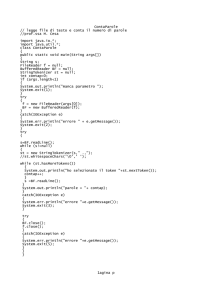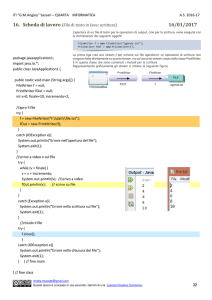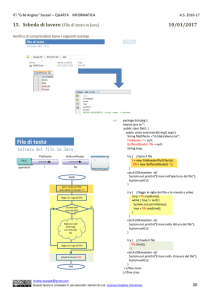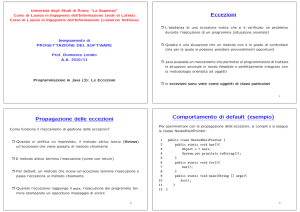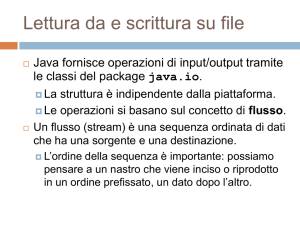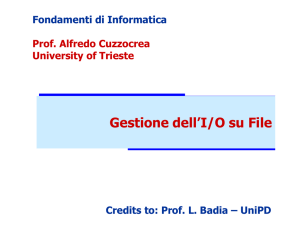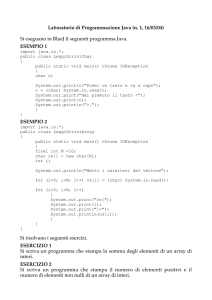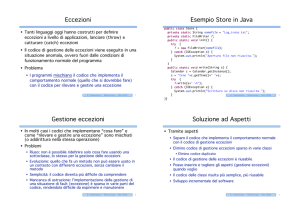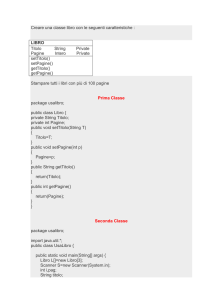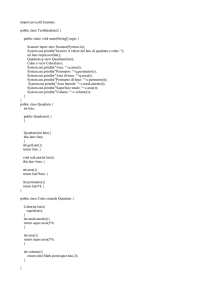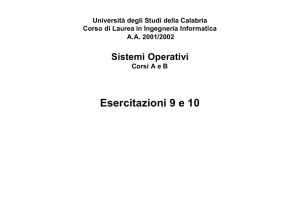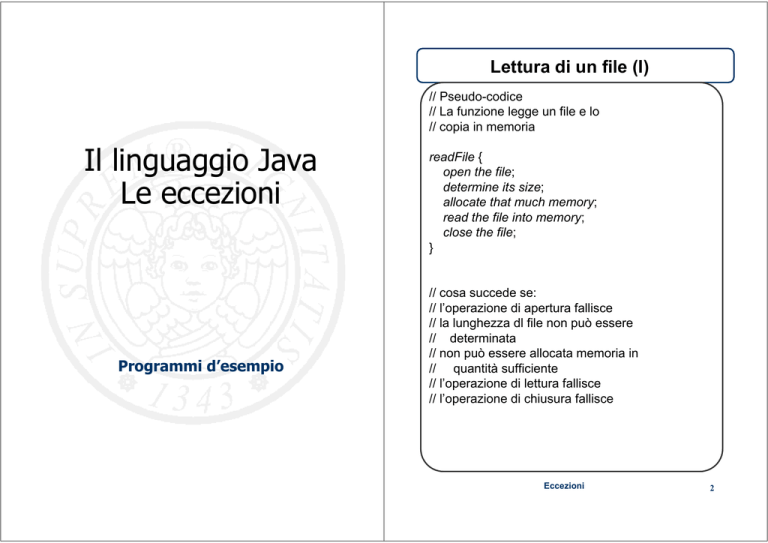
Lettura di un file (I)
// Pseudo-codice
// La funzione legge un file e lo
// copia in memoria
Il linguaggio Java
Le eccezioni
Programmi d’esempio
readFile {
open the file;
determine its size;
allocate that much memory;
read the file into memory;
close the file;
}
// cosa succede se:
// l’operazione di apertura fallisce
// la lunghezza dl file non può essere
// determinata
// non può essere allocata memoria in
// quantità sufficiente
// l’operazione di lettura fallisce
// l’operazione di chiusura fallisce
Eccezioni
2
Lettura di un file (II)
Lettura di un file (III)
// spaghetti code
readFile {
try { // codice “normale”
open the file;
determine its size;
allocate that much memory;
read the file into memory;
close the file;
} catch (fileOpenFailed) { // gestione errore
doSomething;
} catch (sizeDeterminationFailed) {
doSomething;
} catch (memoryAllocationFailed) {
doSomething;
} catch (readFailed) {
doSomething;
} catch (fileCloseFailed) {
doSomething;
}
}
errorCodeType readFile {
initialize errorCode = 0;
open the file;
if (theFileIsOpen) {
determine the length of the file;
if (gotTheFileLength) {
allocate that much memory;
if (gotEnoughMemory) {
read the file into memory;
if (readFailed) { errorCode = -1; }
}
else { errorCode = -2; }
}
else { errorCode = -3; }
close the file;
if (theFileDidntClose && errorCode == 0) {
errorCode = -4;}
else { errorCode = errorCode and -4;}
}
else { errorCode = -5; }
return errorCode;
}
Eccezioni
3
Eccezioni
4
Lettura di un file (IV)
Lettura di un file (V)
method1 {
errorCodeType error;
error = call method2;
if (error)
doErrorProcessing;
else
resto del corpo 1;
}
// method1 è l’unico metodo interessato agli
// errori in readFile
method1 {
call method2;
resto del corpo 1;
}
method2 {
call method3;
resto del corpo 2;
}
errorCodeType method2 {
errorCodeType error;
error = call method3;
if (error)
return error;
else
resto del corpo 2;
}
method3 {
call readFile;
resto del corpo 3;
}
errorCodeType method3 {
errorCodeType error;
error = call readFile;
if (error)
return error;
else
resto del corpo 3;
}
Eccezioni
5
Eccezioni
6
Lettura di un file (VI)
ListOfNumbers (vers. 1)
// questo programma non compila
// volutamente
method1 { // interessato agli errori in
// readFile
try {
call method2;
} catch (exception) {
doErrorProcessing;
}
}
import java.io.*;
import java.util.Vector;
public class ListOfNumbers {
private Vector victor;
private static final int size = 10;
public ListOfNumbers () {
victor = new Vector(size);
for (int i = 0; i < size; i++)
victor.addElement(
new Integer(i));
}
method2 throws exception {
call method3;
}
method3 throws exception {
call readFile;
}
public void writeList() {
PrintWriter out = new PrintWriter(
new FileWriter("OutFile.txt"));
for (int i = 0; i < size; i++)
out.println("Value at: " + i
+ " = "
+ victor.elementAt(i));
out.close();
}
}
Eccezioni
7
Eccezioni
8
Il metodo writeList (vers. 2)
il metodo writeList (vers. 3)
// exception are thrown
// exceptions are caught
public void writeList() throws
IOException,
ArrayIndexOutOfBoundsException {
PrintWriter out =
new PrintWriter(
new FileWriter("OutFile.txt"));
public void writeList() {
PrintWriter out = null;
try {
System.out.println("Entering try
statement");
out = new PrintWriter(
new FileWriter("OutFile.txt"));
for (int i = 0; i < size; i++)
out.println("Value at: " + i
+ " = " + victor.elementAt(i));
} catch (ArrayIndexOutOfBoundsException e) {
System.err.println("Caught
ArrayIndexOutOfBoundsException: " +
e.getMessage());
} catch (IOException e) {
System.err.println("Caught IOException: " +
e.getMessage());
} // to be completed
// file may remain open
}
for (int i = 0; i < size; i++)
out.println("Value at: " + i + " = " +
victor.elementAt(i));
out.close(); // attenzione il file può
// rimanere aperto
}
Eccezioni
9
Eccezioni
10
il metodo writeList (vers. 4)
Crearsi le proprie eccezioni (I)
// a complete version closing the file
class SimpleException extends Exception {}
public void writeList() {
PrintWriter out = null;
try {
System.out.println("Entering try
statement");
out = new PrintWriter(
new FileWriter("OutFile.txt"));
for (int i = 0; i < size; i++)
out.println("Value at: " + i
+ " = " + victor.elementAt(i));
} catch (ArrayIndexOutOfBoundsException e) {
System.err.println("Caught
ArrayIndexOutOfBoundsException: " +
e.getMessage());
} catch (IOException e) {
System.err.println("Caught IOException: " +
e.getMessage());
} finally {
if (out != null) {
System.out.println("Closing PrintWriter");
out.close();
} else {
System.out.println("PrintWriter
not open");
}
}
}
public class SimpleExceptionDemo {
Eccezioni
11
public void f() throws SimpleException {
System.out.println("Throwing
SimpleException from f()");
throw new SimpleException();
}
public static void main(String[] args) {
SimpleExceptionDemo sed = new
SimpleExceptionDemo();
try {
sed.f();
} catch(SimpleException e) {
System.err.println("Caught it!");
}
}
}
// output
// Throwing SimpleException from f()
// Caught it!
Eccezioni
12
Crearsi le proprie eccezioni (II)
Eccezioni padre e figlio
class SimpleException extends Exception {
public SimpleException() {}
public SimpleException(String message) {
super(message);
}
}
public class FullConstructors {
public void f() throws SimpleException {
System.out.println("Throwing SimpleException
from f()");
throw new SimpleException();
}
public void g() throws SimpleException {
System.out.println("Throwing SimpleException
from g()");
throw new SimpleException("Originated in
g()");
}
public static void main(String[] args) {
FullConstructors fc =
new FullConstructors();
try {
fc.f();
} catch(SimpleException e) {
e.printStackTrace();
}
try {
fc.g();
} catch(SimpleException e) {
e.printStackTrace();
}
}
}
import java.io.*;
public class FatherException
extends IOException {
public FatherException() { }
public FatherException(String messaggio)
{
super(messaggio);
}
}
//////////////////////////////////////////
///////////////////////////////////////
public class SonException
extends FatherException {
public SonException() { }
public SonException(String messaggio) {
super(messaggio);
}
}
//////////////////////////////////////////
///////////////////////////////////////
public class Intermedia {
void f(int option)
throws FatherException {
if ( option > 0 )
throw new FatherException("Padre");
if ( option < 0 )
throw new SonException("Figlio");
}
}
Eccezioni
13
Eccezioni
14
La classe pilota
La classe pilota
public class Eccezioni1 {
public static void main(String[] args) {
Intermedia i = new Intermedia();
int opt = 1;
try {
System.out.println(“f: inizio”);
i.f(opt);
System.out.println(“f: fine”);
} catch (FatherException e) {
System.out.println(e.getMessage());
}
System.out.println(“main: fine”);
}
}
public class Eccezioni2 {
public static void main(String[] args) {
Intermedia i = new Intermedia();
int opt = 1;
try {
i.f(opt);
} catch (FatherException e) {
System.out.println(e.getMessage());
} catch (SonException e) {
System.out.println(e.getMessage());
}
System.out.println(“main: fine”);
}
}
//
//
//
//
opt = 1
f: inizio
Padre
main: fine
//
//
//
//
opt = 0
f: inizio
f: fine
main: fine
//
//
//
//
opt = -1
f: inizio
Figlio
main: fine
// Eccezioni1.java [XX:XX] exception
// SonException
// has already been caught
Eccezioni
15
Eccezioni
16
Esempio: la classe pilota
public class Eccezioni3 {
public static void main(String[] args) {
Intermedia i = new Intermedia();
int opt = 1;
try {
i.f(opt);
} catch (SonException e) {
System.out.println(e.getMessage());
}
System.out.println(“main: fine”);
}
}
//
//
//
//
Eccezioni3.java [24:1] unreported
exception
FatherException; must be caught or
declared to be thrown
Eccezioni
17

